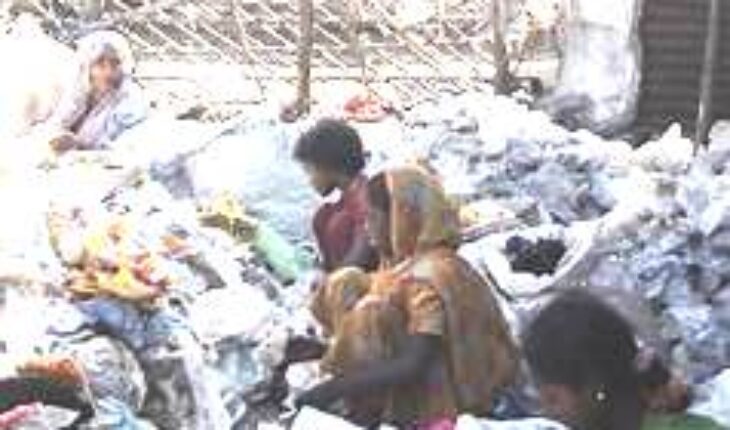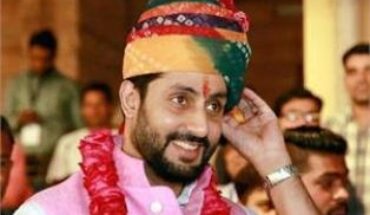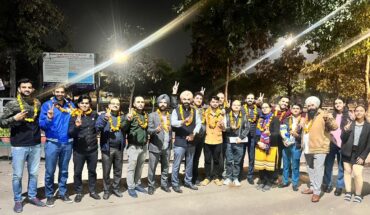By Dominick Rodrigues
Bengaluru,, Nov 27: They are visible — but still remain invisible — to millions of humans around the world, as they work ceaselessly day and night, picking up the rags of humanity’s discarded lifestyles in an effort to earn their bread and feed their hungry families, while dreaming of one day becoming as wealthy as the ones who shed the waste. They are the “ragpickers,” who act as the country’s ‘secondary’ waste collection system with a human identity and measly earnings, amidst miserable living conditions.
A +BBC Media Action+ formative research report showed that most people in Bengaluru, displayed lack of awareness and recognition of the “humans” behind the process of waste management. “While waste on the streets is visible and of concern, informal waste-pickers are virtually ‘invisible’ to most people in Bengaluru where waste management is limited to segregation of waste into dry and wet bins, with negligible understanding of the more invisible parts of the process (such as sorting and recycling),” the report stated.
“While people in Bengaluru are generally thankful for the formal waste collectors, there is a high degree of stigma against informal waste pickers with people commenting on their poor physical appearance, lack of education, problems with addictions and homelessness, and a fear of diseases being spread by informal waste pickers. Informal waste pickers report being discriminated against by the general population because of the nature of their work, and said that they sometimes avoid people in order to escape harassment – thus encouraging their own ‘invisibility’ as a way of dealing with discrimination, bullying and fear for their own safety.”
“There are existing hierarchies in the waste management system, where dry waste collection centre sorters are slightly more formalised than street waste collectors.This hierarchy adds to the invisibility of informal waste pickers, with street waste collectors being the most vulnerable,” the report added.
Meanwhile, eight non-profit organizations recently launched a joint, multi-year project titled +Saamuhika Shakti+ in Bengaluru for improving the lives of informal waste pickers through accelerating systemic change in leading secure and dignified lives. They are: BBC Media Action, CARE, Hasiru Dala, LabourNet, Save the Children, Social Alpha, WaterAid and The/Nudge Foundation, while Sweden-based H&M Foundation – which is funding the project — has committed $11 million for three years in the first phase of the project — with scope for expanding it by three additional years.
Saamuhika Shakti follows the ‘Collective Impact’ approach, which is a commitment of a group of different actors working together in a structured manner for a common agenda, and to solve a specific social problem at scale.
Maria Bystedt, Strategy Lead, H&M Foundation, said the Foundation sought to promote a systems change mindset by working through diverse groups joining forces in commitment to a common agenda for solving complex challenges. “By bringing together all these fantastic partners to work towards the same goal, we are confident that we can achieve more and contribute to creating long-term positive change,” she said.
The Project’s first three years involve tailoring interventions to attain six key outcomes for helping waste pickers and their families to have: Higher and more stable income; Improved and safer working conditions; Ability to move to alternate professions if they desire; Access to affordable and quality services from the public and private sector; Established support systems for victims of violence and substance abuse; More respect and recognition for their work from the residents of Bengaluru; and deeper appreciation and pride in the important role they play in the waste value chain.
Gender equity and equitable access for women, girl child and other vulnerable groups forms a core component of the Saamuhika Shakti project, where all partners are committed to ensure that vulnerable and disadvantaged persons have equitable access to programs and services that can lead to improved living conditions.
Primary and secondary research conducted prior to the Saamuhika Shakti program design revealed there are at least 22,500 waste pickers in Bengaluru city comprising informal street waste collectors, sorters in DWCCs and scrap shops and itinerant waste buyers, who go house-to-house in purchasing dry waste of low and high value. These informal waste pickers belong to disadvantaged castes and minority groups, have low education levels and are from within Karnataka and outside. Though informal waste pickers are a vital part of the waste management system in Bengaluru and contribute in significant measure economically and environmentally, they struggle to lead a healthy, productive and dignified life.
“Spread across the BBMP geographical areas, waste-pickers form clusters of communities often without even basic access to resources such as clean water or sanitation facilities, let alone opportunities to improve livelihoods and that of their children. Through Saamuhika Shakti, we hope to provide prospects for better outcomes in an equitable manner for waste pickers and their families,” said Lakshmi Pattabi Raman, Executive Director of Saamuhika Shakti, The/Nudge Foundation.
“The ongoing pandemic, and the many changes it has necessitated, has wrought extreme hardship on the already marginalised, including the waster picker community in Bengaluru. Work, income streams and working conditions have been severely impacted alongside the avenues available to their children and families to explore pathways to better life opportunities. Spread across the Bengaluru urban and rural landscape, the need to provide access and support has become more urgent than before. All partners of Saamuhika Shakti have taken cognizance and programs now incorporate steps to mitigate and overcome the challenges due to COVID19,” she said while appealing to citizens to consider the waste-picker community’s plight and hardships faced on a daily basis, and also being responsible in disposing garbage through using the right receptacles, and trashing hazardous waste (disposable masks, gloves etc.) safely.
Excited to be an integral part of Saamuhika Shakti, and bring social and behaviour change communication experience to help create greater social acceptance of informal waste pickers in Bengaluru, Priyanka Dutt, Country Director, BBC Media Action India, said “We believe in the need to change people’s thinking and feelings towards waste pickers in their journey – from waste pickers being invisible — to being recognized as doing important, skilled work that contributes to society and the environment.”
“CARE India, stands firmly behind Saamuhika Shakti as a committed partner to enhance the Dignity of the Waste Pickers, and will focus on enhancing the life choices and livelihoods of the waste-pickers and their families. CARE India seeks to multiply impact on the lives of the Waste Pickers by working in close coordination with partners and stakeholders,” said Nabesh Bohidar, Regional Program Manager, South Hub, CARE India
“Sambhav brings together the world of education, employment, and entrepreneurship to create intersections capable of increased income and improved productivity through its livelihood platform. So far, we have touched the lives of 01 million people pan-India. Through the H&M Foundation-led Saamuhika Shakti initiative, we want to create exit opportunities for waste pickers and their family members, who are seeking alternate livelihood opportunities through skill development initiative and employment support over a three-year engagement period,” observed Dr Gayathri Vasudevan, Chairperson, LabourNet
“Hasiru Dala believes that in six to eight years, waste pickers will not be picking waste on the streets in the way that they do today. Children of waste pickers will have the opportunity to choose their livelihoods and we hope that Saamuhika Shakti will accelerate this process,” stated Nalini Shekhar, Co-Founder and Executive Director, Hasiru Dala.
“The challenges faced by the waste picker communities including their children are manifold and it is high time we came together as expert organisations to address various issues holistically. We bring in over 100 years of experience working on the rights of the children and are happy to be part of the Saamuhika Shakti initiative to improve the conditions of children by connecting them with a learning environment and dealing with other issues like WASH and Gender,” said Vikas Gora, Deputy Director, South India, Save the Children.
Madhushree Narayan, Programme Director, Social Alpha, said “Climate action, circular economy and livelihoods enhancement are a critical part of Social Alpha’s charter and we have built a strong portfolio of companies working in waste management. It has become more important than ever to converge the efforts and resources to address waste management, a significant problem plaguing humanity today. We believe that science and tech innovations can play a crucial role in creating impact and improving the overall quality of life of people engaged in waste management. Our partnership with Saamuhika Shakti reinforces our commitment towards scaling start-ups and innovations to accelerate climate action in India.”
“Lack of access to WASH to waste pickers is a denial of their fundamental right to survival. As a part of the collective – ‘Samuhika Shakti’, WaterAid stands to make clean water, decent toilets and good hygiene a normal part of everyday life for waste pickers’ families and their communities in Bengaluru. We will work with local partners and influence decision-makers to maximise our impact,” added Aanand Kumar, Head of Programmes, WaterAid India.
Mr Mansoor, who manages a ‘Dry Waste Collection,Segregation Centre’ in Bengaluru, highlighted the knowledge gained from his attending the “Climate Change 2015 COP” in Paris. “Failing to recycle one tonne of paper calls for cutting that many trees, while rain allows water –polluted by waste – to seep into the ground. So segregation of waste is needed to be done, especially in homes, and sending to recycling directly. Do not burn recyclable material as it may cause health problems like cancer,” he urged.
The H&M Foundation is an independent, non-profit, global foundation headquartered in Stockholm, Sweden and is privately funded by the Stefan Persson family, founders and main owners of the H&M group. Founded to accelerate progress towards the UN Sustainable Development Goals 2030, H&M Foundation uses collaboration and innovation to co-create, fund and share solutions for the world’s most urgent challenges. Since 2013, the family has donated SEK 1.5 billion.
BBC Media Action, the international charity arm of the BBC, uses media and communication to inform, connect and inspire people around the world. As a part of Saamuhika Shakti, BBC Media Action’s project – +A Pathway to Respect, Identity,Dignity and Empowerment (PRIDE)+ – aims to shift perceptions about waste-picking and informal waste-pickers in the city of Bengaluru by using a human-centred design approach through its work that is rooted in evidence, powered by insights, and leverages impact-tested, scalable, big ideas to create social and behaviour change. BBC Media Action commissioned a formative research study between July-September 2020, to understand current perceptions of the waste-picker community among the people of Bengaluru, and the challenges that faced waste-pickers. Following a robust procurement process, Karvy Insights was selected to work with BBC Media Action’s research team on this formative research with initial online qualitative research, followed by a quantitative online survey. Overall, there were 56 qualitative activities including focus-group discussions (with general populations) and in-depth interviews (with waste management practitioners and waste-pickers). The research, which was conducted remotely using telephonic/ video interactions, also included 406 online surveys with social media-users in Bengaluru.
The/Nudge Foundation is a Bengaluru-based nonprofit seeking to alleviate poverty sustainably and at scale. Established in 2015, The/Nudge Foundation is ~300 people strong team innovating to solve diverse problems of development through the Centre for Skill Development and Entrepreneurship, Centre for Rural Development and Centre for Social Innovation.






